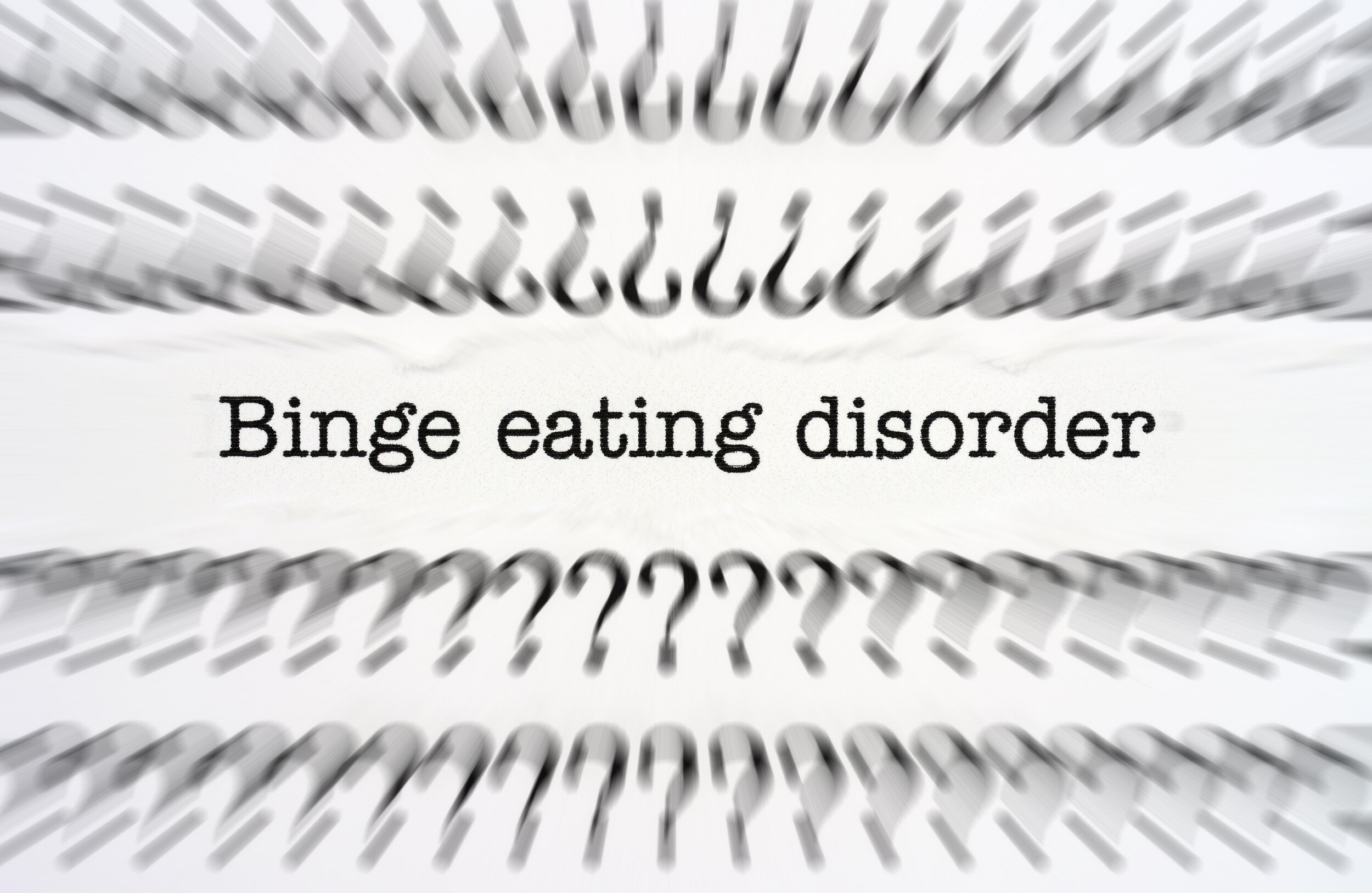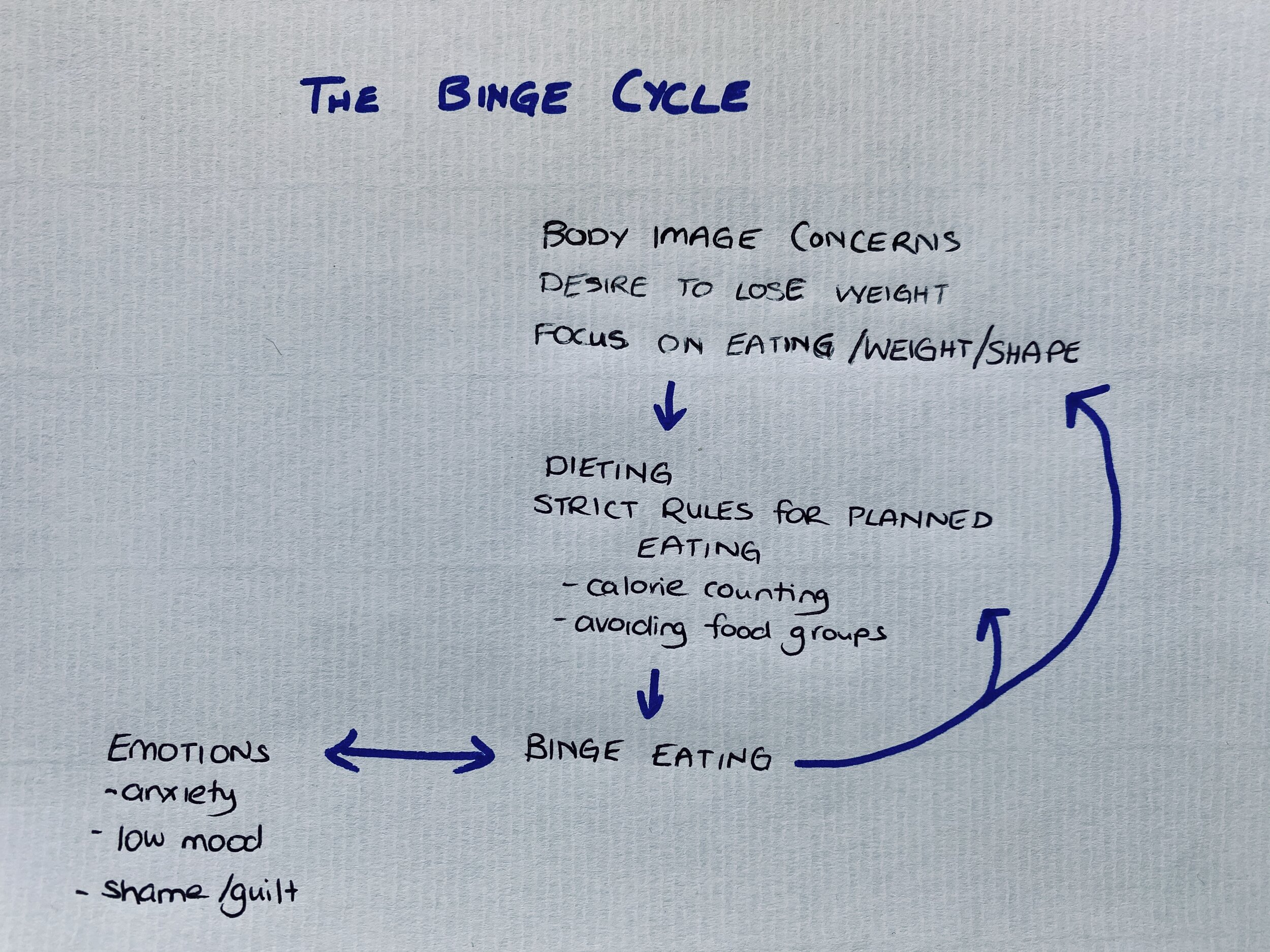Binge Eating Disorder
WHAT IS BINGE EATING DISORDER?
Binge eating disorder is an eating disorder in which people feel compelled to binge eat on a regular basis. Binge eating disorder involves the consumption of a large number of calories over a relatively short period of time, during which people experience a sense of loss of control. Bingeing is triggered by both physiological factors (hunger) and emotional factors such as stress, depression or anxiety, although this trigger is not always obvious. As such binges can occur when a person is not hungry. Binges may be planned in advance and will often involve “special” binge foods or foods that are avoided in the person’s day-to-day diet.
Certain eating behaviours are likely to be present during a binge: eating rapidly; eating until you’re uncomfortably full; eating large amounts when you’re not hungry; or eating alone in order to hide the amount you are eating. This is typically followed by feelings of shame, disgust, or guilt.
Individuals with binge eating disorder do not attempt to get rid of the calories they consume during a binge (as in bulimia nervosa), meaning that BED is often, although not always, associated with obesity. For those struggling with this condition, a binge eating therapist can provide support through online therapy or consultation to address the underlying psychological issues. Individuals who are overweight or obese may not realise that they are suffering from a psychological condition that is contributing to their weight difficulties.
TREATMENT FOR BED
Cognitive Behavioural Therapy (CBT) is known to be the best treatment for binge eating disorder (NICE Guidelines, 2004) and is most commonly recommended by our clinicians. For people who binge eat or use compulsive eating as a way of managing difficult emotions, dialectical behaviour therapy (DBT) may be recommended as an alternative.
Cognitive Behavioural Therapy
Cognitive Behavioural Therapy (CBT) focuses on both physiological and emotional triggers to binge eating, establishing a healthy eating plan in order to reduce physiological urges, and providing insight into and skills for coping with emotional triggers.
Healthy Eating Plan
A healthy eating plan entails eating regularly (typically three meals and three snacks a day) and including all food groups in your diet (including treat foods). Advice is given on how to develop a weight maintenance diet - and this often significantly reduces or even stops binge eating. Your therapist will support you in putting this into place and using food diaries to help you notice any patterns or triggers for residual bingeing.
Further CBT techniques can then be developed to help you address these. This might include CBT techniques to help you challenge unhelpful thinking (such as thought challenges), techniques to help you manage difficult emotions (such as self-soothing) or techniques to manage any behaviours which feed into your bingeing (such as behavioural experiments). CBT techniques can also be used to look at any other issues, including body image concerns, low self-esteem, or perfectionism.
Many people will find that this is sufficient, and that body image is much improved following treatment. For those who are overweight who wish to lose weight, further dietetic support can be given to make small, healthy weight changes without triggering the binge eating disorder.
CBT is a structured skills based therapy that is most suitable for people who want to be guided by their therapist to find new ways of coping.
Dialectical Behavioural Therapy (DBT)
For people who binge eat in combination with other impulsive behaviours such as binge drinking or self harming, DBT may be recommended as an alternative to CBT. DBT is an emotional skills based treatment that combines eastern approaches (Buddhist theory, Eastern psychological and spiritual philosophies) and western therapies, including CBT. DBT sees bingeing as having developed as a way of coping with or surviving difficult emotions, and focuses on developing healthy ways of responding to emotions in the here and now.
Dialectical behaviour therapy encourages change but also promotes acceptance - both of the individual and of where they are along the road to recovery. A dialectical approach encourages people to let go of black and white thinking (“I’m either recovered or stuck with this eating disorder forever”) and to develop a more balanced perspective (“I am working towards recovery and there may be bumps along the way”). This can also be helpful in challenging other black or white thinking typically seen in those with eating disorders.
DBT offers a skill-based approach to developing healthier ways of coping, and comprises of 4 sets of skills:
Mindfulness (learning how to be in the moment and make decisions using your “wise” mind)
Distress tolerance (learning how to tolerate and manage difficult emotions in a crisis)
Emotional regulation (learning how to identify emotions and help reduce the likelihood of extreme changes in emotion)
Interpersonal effectiveness (becoming more assertive, asking for help when needed, and saying no)
Specialist Team
The London Centre comprises specialist health professionals trained in evidence-based treatments for eating disorders. Our expert team includes eating disorder therapists in London such as:
Psychiatrists
Clinical Psychologists
Counselling Psychologists
Trainee Psychologists
Occupational Therapists
Dietitians
Family/Couple Therapists
Diverse Treatment Options
The clinic's specialist nature and the experience of its team enable us to offer a wide variety of treatment approaches and therapies, including binge eating disorder programmes. The clinics offer both in-person and remote consultations, making binge eating therapy online accessible to all.Personalised Care
At the London Centre, a private eating disorder clinic in London, we believe in aligning our patients with both the right clinician and the appropriate treatment. While we ensure the use of evidence-based therapies, such as counselling for binge eating, we also ensure taking the time to listen to client preferences. This approach enables us to find the therapist and approach that best suits your needs, whether you're seeking help with binge eating or rehab for binge eating.Testimonials
How it works
Our team conducts a comprehensive evaluation, leveraging the expertise of multiple specialists, including eating disorder psychiatrists in London, to ensure that our treatment is effective and tailored to your personal recovery.
Step 1
Contact Us
If you're in doubt and wondering, 'Do I have binge eating disorder?' you can contact us with any questions you might have via phone, email, or by using our online contact form before making an appointment. Your first contact will most likely be with Kerry, our wonderful PA.Step 2
Assessment
Before the initial session, clients are requested to complete a brief questionnaire regarding their current circumstances, preferences, and availability for appointments. While not mandatory, this information assists us in matching individuals with the most suitable clinician, whether for binge eating disorder therapy or other related services.Step 3
First Session
Following the assessment, clients will have a session to discuss their recommended treatment plan. A start date will be agreed upon, and arrangements will be made for an initial session to begin treating binge eating disorder.Featured
FAQs
-
The fees do vary depending on, which clinician you see. For a full summary of our fees, what health insurance company policies we accept, and details about making payments please click the link. (https://www.thelondoncentre.co.uk/fees)
-
Our Team PA, Kerry, is available to answer any questions you may have prior to booking an assessment. If you would like to discuss treatment options, such as the best treatment for binge eating disorder or general support, you can schedule a call with Mini Jones, our Clinic Lead. For further information or to request a callback, please click the link provided to get in touch via email, phone, or through our online contact form.
-
It is important to note that we do have a 24-hour cancellation policy on all booked appointments. Any cancellations received within 24 hours remain fully charged.
We request payment for an initial assessment appointment in advance of your appointment, which you can make over the phone using a debit or credit card or via the secure payment link sent to you with your invoice. For any further treatment sessions, and unless covered by private health insurance, we will invoice you sessionally, which is payable upon receipt. However, we offer a maximum 30-day period to receive payment.
All appointment reminders will be sent to you via our client management system 'Cliniko' - notifications@cliniko.com. Please add this email address to your inbox contacts to ensure all communications are received promptly.
-
Therapy is most effective when a series of appointments tailored to your individual requirements can be established. The NICE guidelines suggest between 20-40 appointments, but we are guided by our clients depending on their needs, preference, and motivation to adopt change. We will always remain flexible to accommodate your preferences, whether you're seeking a binge eating cure or ongoing support.




